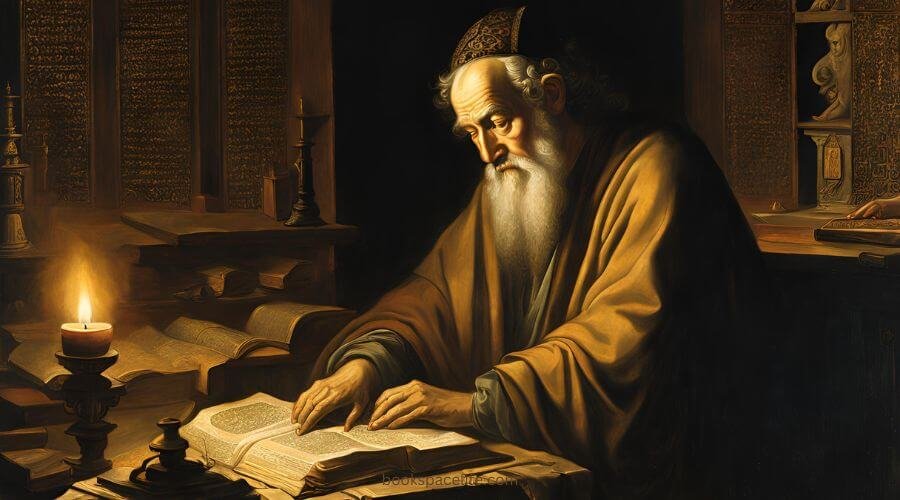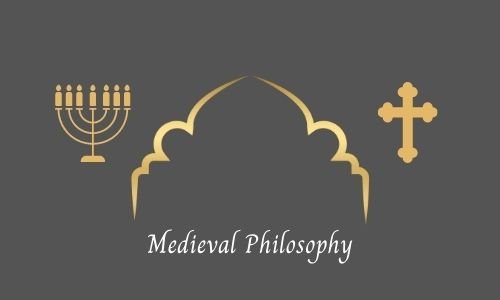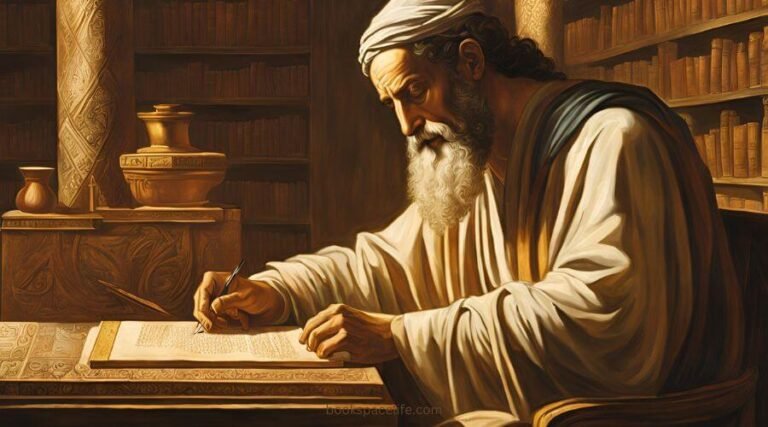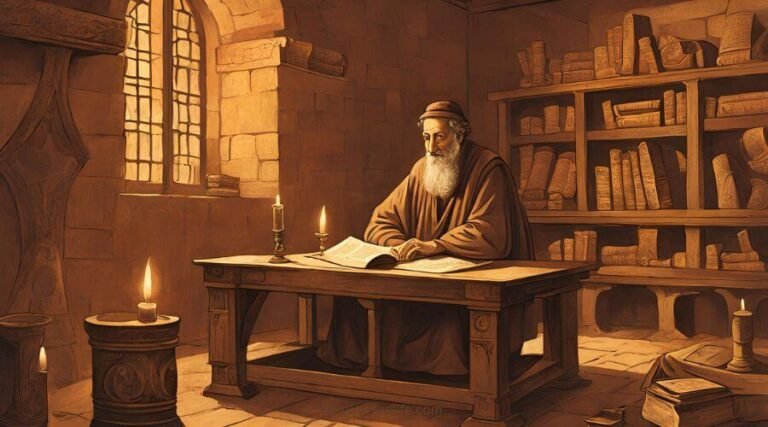Philo of Alexandria
Moses de Leon: A Jewish Philosopher and Mystic of the Middle Ages
Moses de Leon (1250–1305 CE) stands as one of the most influential figures in Jewish mysticism, particularly in the development of Kabbalah.
His contributions to Jewish philosophy and mysticism have had a lasting impact, both in his time and in later centuries, shaping the course of Jewish thought, mysticism, and spirituality.
De Leon’s most famous work, Zohar (The Book of Splendor), is regarded as one of the foundational texts of Kabbalistic thought.
Though much of his life remains mysterious, Moses de Leon’s philosophical ideas, mystical teachings, and legacy continue to influence Jewish spirituality today.
In this blog post, we will explore the life of Moses de Leon, his education, travels, philosophy, and his profound impact on Jewish thought and mysticism.
Table of Contents
(1) Early Life and Background
Moses de Leon was born in the mid-13th century in the town of Guadalajara in Castile, Spain. The exact year of his birth is unclear, but it is generally believed to be around 1250.
His early education was rooted in the traditional Jewish studies of Torah, Talmud, and Jewish law (Halakhah), which were central to the lives of Jewish scholars at the time.
Spain, during the medieval period, was a melting pot of intellectual and religious ideas, where Jews, Muslims, and Christians often engaged in vibrant philosophical and theological discourse.
This environment of cross-cultural exchange would have greatly influenced de Leon’s intellectual development.
As a young man, Moses de Leon traveled throughout Spain, living in various Jewish communities, such as Toledo, Seville, and Granada.
During these travels, he was exposed to different strains of Jewish thought, including the works of earlier Jewish philosophers like Maimonides and the Kabbalistic teachings that were emerging in Spain at the time.
De Leon’s education was likely a combination of formal Jewish learning and personal engagement with mystical traditions.
Though much of de Leon’s early education is not extensively documented, it is believed that he was well-versed in Jewish philosophy, particularly the works of the Ramban (Nachmanides), a medieval Jewish scholar known for his mysticism and philosophical writings.
The influence of Maimonides, especially his Guide for the Perplexed, can also be seen in de Leon’s works, though de Leon ultimately diverged from Maimonides’ rationalist approach in favor of more mystical and esoteric ideas.
(2) Philosophical and Mystical Influence
Moses de Leon’s most significant contribution to Jewish philosophy and spirituality was his involvement in the development of Kabbalah. Kabbalah, a form of Jewish mysticism, focuses on the esoteric, mystical aspects of the Torah and Jewish law.
It explores divine realms, the nature of God, and the secrets of creation through symbolic and allegorical interpretations of sacred texts.
While Kabbalistic ideas had been present in various forms before de Leon’s time, it was under his influence that the mystical tradition began to take on a more systematic and structured form.
De Leon’s most famous work, Zohar, is considered the magnum opus of Kabbalistic literature and one of the most important mystical texts in the entire Jewish tradition.
The Zohar is a multi-volume commentary on the Torah, written in an intricate and symbolic style. It is filled with mystical interpretations of the biblical stories, exploring the hidden meanings behind the text and revealing profound spiritual truths.
De Leon’s teachings in the Zohar center on the concept of the divine unity of God.
In Kabbalistic thought, God is understood as a single, ineffable source of all creation, known as the Ein Sof (the Infinite).
This divine unity is then expressed through a system of ten attributes, known as the Sefirot, which represent different aspects of God’s presence in the world.
The Sefirot are often depicted in a diagram, known as the Tree of Life, and form the basis of Kabbalistic cosmology.
One of the central themes in the Zohar is the idea of Shekhinah, the feminine aspect of God’s presence in the world.
De Leon’s writings emphasize the role of the Shekhinah as the divine presence that dwells within the world, guiding creation toward redemption.
This concept of the Shekhinah became a central idea in later Kabbalistic thought and continues to be an important element in contemporary Jewish mysticism.
The Zohar also presents a mystical interpretation of the Hebrew Bible, seeing the Torah not only as a legal and moral document but also as a blueprint for understanding the inner workings of the universe.
According to de Leon, the Torah contains hidden, divine knowledge that can only be accessed by those who have attained a deep spiritual understanding. In this way, de Leon’s Kabbalistic approach to the Torah was radically different from the more rationalist and legalistic interpretations put forth by philosophers like Maimonides.
(3) The Mystical Teachings of the Zohar
Moses de Leon’s philosophy was steeped in mystical ideas about the nature of God, creation, and the human soul.
According to de Leon, the process of creation was an emanation from the divine, unfolding through a series of stages. In this view, God’s creative power flows from the Ein Sof, the Infinite, through the Sefirot, and eventually into the material world.
De Leon’s teachings emphasized the interconnectedness of all creation, from the highest divine realms to the lowest physical levels.
One of the central themes of de Leon’s Kabbalah is the notion of the Tikkun Olam, the restoration or healing of the world.
This idea suggests that the world is in a state of spiritual disrepair, and that it is the responsibility of human beings to restore harmony by engaging in spiritual practices that help repair the brokenness of creation.
For de Leon, the study of Kabbalah, prayer, and adherence to Jewish law were all means of participating in this process of cosmic healing.
In addition to his teachings on God and creation, de Leon’s mystical philosophy also delves deeply into the nature of the soul. According to de Leon, the soul is a divine spark that descends into the material world but retains its connection to the divine.
Through the practice of mystical contemplation and prayer, the soul can ascend back to its divine source, achieving union with God.
This ascent is seen as the ultimate goal of human existence and the fulfillment of one’s spiritual purpose.
(4) Legacy and Impact
Moses de Leon’s influence on Jewish thought is immense, particularly in the realm of mysticism.
The Zohar became the foundation for much of later Kabbalistic literature and continues to be studied by Jewish mystics and scholars around the world. Kabbalah, as it developed through the Zohar and de Leon’s teachings, became a major force in Jewish spirituality, influencing the development of Hasidism in the 18th century and continuing to shape contemporary Jewish mysticism.
De Leon’s work also had an impact on Jewish philosophy, especially in the areas of metaphysics and theology.
His teachings on the nature of God and creation challenged the more rationalist approaches of earlier Jewish philosophers, such as Maimonides, who had emphasized the importance of philosophical reasoning and logic.
De Leon’s mystical approach, with its emphasis on hidden, esoteric knowledge, presented a different path for understanding God and the universe.
Despite his profound influence on Jewish mysticism, de Leon’s life remains somewhat mysterious.
Little is known about his personal life, and much of what we do know is derived from his writings and the accounts of later scholars. It is believed that de Leon’s mysticism and his connection to the Zohar were part of a broader spiritual movement in Spain during the 13th and 14th centuries, which sought to deepen Jewish religious practice and understanding through mystical insight.
(5) Conclusion
Moses de Leon remains one of the most important and enigmatic figures in the history of Jewish thought.
His contributions to Jewish mysticism, particularly through his work on the Zohar, have had a profound and lasting impact on both Jewish and non-Jewish intellectual traditions.
Through his teachings, de Leon emphasized the idea that the ultimate truths of existence could not be fully understood through reason alone, but required mystical insight and spiritual experience.
De Leon’s legacy is one of profound spiritual insight, and his work continues to inspire mystics, philosophers, and scholars alike.
As one of the central figures in the development of Kabbalah, Moses de Leon shaped the course of Jewish thought for generations and continues to influence the way we understand the relationship between the divine, the world, and the human soul.








